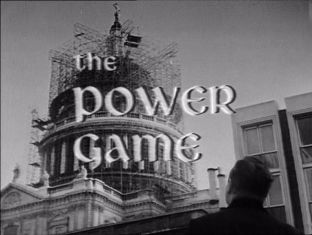

The Hammer of Bligh
Did Hammer Films Inspire The Power Game?.
Sir John Wilder (Patrick Wymark), lead character in “The Power Game” , borrowed some of his characteristics from real-life captains’ of industry. Did Hammer Films’ Carreras family inspire the fiery relationship between his adversary Caswell Bligh and his son Kenneth?
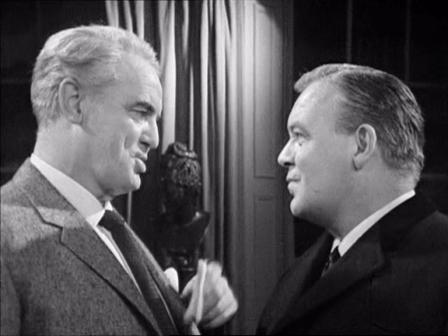
“The Power Game” saw Wilder becoming joint managing director of Bligh Construction, the family firm run by Caswell Bligh (Clifford Evans) and his son Kenneth Bligh (Peter Barkworth). Part of Wilder’s strategy was to wrest control of the company by exploiting the toxic relationship between the Blighs. The question is whether the Bligh’s had a real-life inspiration and whether part of this was Hammer Films’ Carreras family?
Hammer Films is best known for its horror movies such as “Curse of Frankenstein” and “Dracula” starring Peter Cushing and Christopher Lee. Clifford Evans starred in two Hammer productions – “Curse of the Werewolf” (1960) in which he played Oliver Reed’s foster father and Kiss of the Vampire (1962) in which he played the Van Helsing substitute Professor Zimmer. Hammer films was a family firm, run during the 1950’s and 60’s by “Lieutenant Colonel” James Carreras and his son Michael Carreras. James was an ex-car salesman and natural deal-maker in the Lew Grade mode. Much of the early success of Hammer Films can be attributed to his knack of securing funding from American studios – often on the back of nothing more than the title and a lurid poster. Carreras Senior enjoyed socialising through his work with the Variety Club charity . While it is sometimes said that he used the proceeds from Hammer to finance his charity work, it’s undeniable that the Variety Club also allowed him to mix with the highest levels of British film finance and distribution, thus ensuring a steady flow of order for Hammer. The Variety Club also provides another Wilder connection; Carreras met Josephine Douglas, director of the Plane Makers episode “A Question of Supply” through the Variety Club (An experienced TV producer – “6.5 Special”, “Emergency Ward 10” -Douglas later landed a job as line producer for Dracula AD 1972)
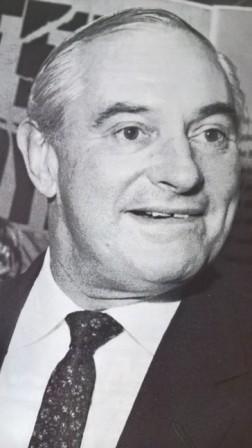
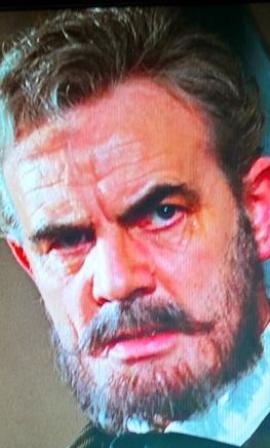
Lieutenant-Colonel James Carreras and Professor Zimmer
His son, Michael Carreras was arguably more of a film fan than a deal-maker. Unlike his father, who took little interest in production matters, Michael Carreras quickly began producing and directing fillers (including one featuring Cyril Stapleton and the Showband (1955) - who would later record the 1967 theme to The Power Game).Although he enthusiastically moved to directing thrillers, he wanted Hammer to broaden its horizons past horror films. He tried to break away with his own production company in December 1960. Capricorn Productions made only two movies – The Savage Guns, and What A Crazy World, before Michael returned to Hammer in 1963.
In a fascinating article in “ Little Shoppe of Horrors” 13 (1996) Denis Meikle argues that Capricorn Films was undermined by, “a closed shop operated by a coterie of luncheon-clubbers” who “had set their faces against any involvement with the ‘ungrateful’ son of a friend and fellow Variety Clubber..for fear of offending the man who maintained powerful allies in the US and who was still supplying much of their more popular product.”
On TV, the Bligh family was introduced in the first episode of “The Power Game” . Sir John Wilder, having left the aircraft industry, was looking for new challenges. He was sitting on the board of a merchant bank that was looking to invest in the Bligh Construction firm and needed to put their own man in as joint managing director.
Publicity for the TV show says Caswell Bligh left school at 14 to join his father’s firm in Preston making tombstones. Caswell built up the business, winning local government contracts for paving stones by fixing the Clerk of Works. He further increased the company’s profitability by some dodgy dealing while building American airbases during the second world war. Bligh later joined the Royal Engineers winning the rank of Lieutenant-Colonel (Carreras, it should be noted, was educated at Manchester Grammar School, promoted to Lt-Col while serving in the Honourable Artillery Company and awarded the MBE for his service in the defence of London. It was after the war that he began winning finance from America that lay the foundations of Hammer Films.)
In the first episode of “The Power Game”, Bligh is resistant to any attempt to diminish his control of the Bligh Construction, despite the fact that he spends much of his time and resources as a member of the National Export Board. Bligh is lobbying for the government to create a “Ministry of Roads” with himself as Minister overseeing a massive expansion in motorway construction.
Wilder convinces Bligh to accept him when he points out that Bligh’s son Kenneth (Peter Barkworth) wants control of the company. “He doesn’t know it yet. He’s got to cut somebody’s throat to do it. Yours -or mine – if I’m here.”
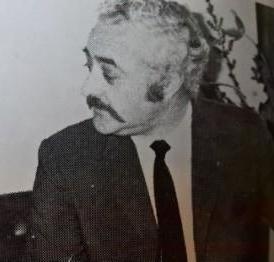
Michael Carreras
Ken Bligh is portrayed by Peter Barkworth as frustrated. He is haunted by a reputation for having underpriced bids on early construction projects, although in one episode (“Late Via Rome”) Ken exploits his reputation for bungling bids to fool a business partner into thinking a project is going to be a disaster and trick them into pulling out . Ken is also frustrated by Caswell’s refusal to try new ideas. In “The Big View” Ken tells him. “You only ever think of your own image. You never think, ‘is it a workable idea? Is it suitable for requirements?’ Only, ‘has it ever been done before?’ Nasty new idea! How’s Bligh’s going to look?”
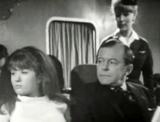
Peter Barkworth as Ken Bligh
At the end of the 1966 series, Ken sells his shares in Bligh Construction, and buys a sub-contracting company. Unfortunately, in his final 1969 episode (“The Heart Market”) we learn that Ken has lost money on two more projects. Caswell’s final verdict is that he was never cut out for business and should have been a parson or a schoolmaster. The irony is that Bligh would never have tolerated Ken being a success. Caswell fills his board of directors with “yes-men” and constantly interferes in projects that Ken has set up. As Wilder tells Caswell in “Standard Practice” “To see him standing on his own two feet would have knocked you off your own!”
So were the Bligh’s based on the Carreras family? We will probably never know. Power Game writer Edmund Ward had a background in the construction industry (later exploited in his series “The Hanged Man” starring Colin Blakely) and it’s possible that such an adversarial relationship existed in many other British family firms. It’s also fair to acknowledge that once he’d won the finance for his movies, James Carreras did not interfere in production. However, there are similarities. Both James Carreras and Caswell Bligh started out in the North East and turned a small family firm into a powerhouse. Both Caswell Bligh and James Carreras wanted to stick to a winning formula – British public works for Bligh, American-backed horror films for Carreras. Both sons wanted to do something different – Ken Bligh wanting to win construction projects in Africa, while Michael Carreras wanted to make musicals and big budget epics. In “The Power Game” Ken Bligh’s fatal flaw is implied to be his honesty (or credulity) in a world where everyone is lying. And in real life, Michael Carreras attempt to set up his own film company seems to have been undermined because the market was already stacked against him.
In the end we have to remember that Rex Firkin said there were at least three inspirations for Sir John Wilder. So even if the Bligh’s did have something of the Carreras family in them, there may have been other inspirations too. And any inspiration is just a starting point. Once an actor is a success –as both Clifford Evans and Peter Barkworth were – the writers start adjusting for the nuances they bring. And the characters are still merely puppets moving in the direction the Script Editor wants the story to go.
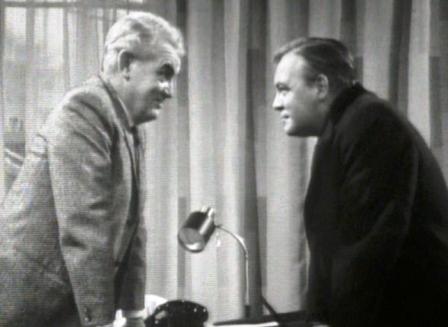
Still, there was one final twist worthy of Caswell Bligh himself.
In 1972, Michael Carreras learned that his father was negotiating to sell Hammer Films to its rival Tigon Films. There was nothing in the agreement to guarantee Michael’s position as managing director so, in order to secure his future, he took out a loan from the ICI Pension Fund to buy the company, thinking agreements were in place with British distributors to develop new movies. Unfortunately, he found that all he had bought was a name. Many distributors were no longer willing to honour agreements made with Sir James - even those with whom James Carreras now had a contract as a consultant. Although Michael Carreras soldiered on for several more years, it must have seemed like history repeating itself. *
*Source: Hammer Films: The Elstree Studios Years by Wayne Kinsey.